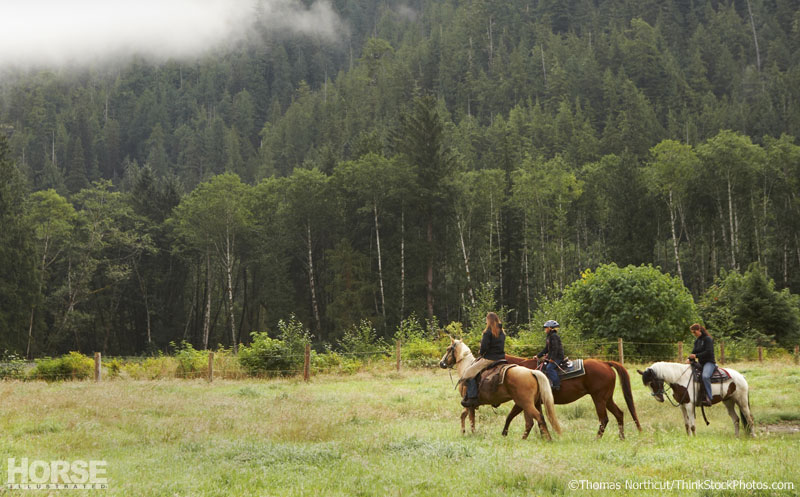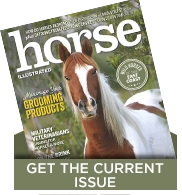
Public and private trails that were once open to equestrians are disappearing every day. What can an average trail rider do about it? Plenty. Here are some tips to get started.
- Use it or lose it. Here’s an easy one: Get out there and use the public trails in your area that are still available to equestrians. It’s easier for landowners and decision makers at your local park to close trails to equestrians if there aren’t too many riders out there. Be an active, responsible user of your local trails so that the world knows equestrians still exist!
- Be a good steward. Pay your dues or fees, clean up after your horse and yourself and obey the posted rules of the trail. This may seem obvious, but even experienced trail riders can get careless. Get your friends or local trail riders’ group together for trail maintenance days. Volunteer to clean up trash and move fallen branches from the local equestrian trails. Be the kind of trail user that land managers want to have around.
- Join forces. Become a member of your state horse council, local horsemen’s group, or trail riding club. Networking with other riders will help you stay abreast of the issues are threatening riders and rural land owners in your area and provide an opportunity to work together toward positive solutions.
- Be courteous, even if you don’t want to. Yes, equestrians technically have right-of-way on most mixed-use trails, but that doesn’t mean you shouldn’t be considerate. Make every trail user’s interaction with an equestrian as pleasant as possible. Smile and say thank you when someone pulls off the trail to let you and your horse pass. When you encounter an oblivious trail user speeding around corners on their mountain bike or letting their dog run amok, assume that they’re not malicious, they just don’t know better. Saying, “Would you mind holding your dog over to the side while we pass? I don’t want him to get stepped on,” is a lot more effective then yelling obscenities, even if that’s your first impulse.
- In fact, make friends with your fellow outdoor recreationalists. We all have similar goals. We want safe, accessible parks and trails in which to enjoy our favorite sports and activities. Speak to local hiking and cycling clubs so you can share concerns and even organize trail maintenance days together. It’s a lot better to work through trail conflicts together than to stay isolated from one another and point fingers when problems arise.
- Know the facts, and share them. Horses often get blamed for having a negative impact on the environment, but research has shown otherwise. For example:
- Research from the Delaware National Heritage Program showed that horses and riders were generally less disturbing to wildlife than joggers, hikers and even photographers.
- Several studies have shown that waste left behind by horses on the trail did not have an adverse effect on water supplies.
- Horses are often implicated in causing accelerated trail erosion, but studies have shown horses do not cause more erosion than human foot traffic or natural environmental processes. Get more information at ELCR.org
- Call your senator. Many riders enjoy riding in state and national parks and in national forests. Sometimes, these trails are closed or reclassified with little input from users. By knowing what’s going on in your state and national government, and rallying your fellow trail riders, you can make sure your voice is heard. Believe it or not, those phone calls and letters to your senator or representative do matter. Keep up with national issues through the American Horse Council, the Equine Land Conservation Resource, and Back Country Horsemen of America.
Do you trail ride on public land?
Ultralight Horse Packing
Leslie Potter is Sr. Associate Web Editor of HorseChannel.com. Follow her on Twitter: @LeslieInLex.







Very good advise. worth re-reading.
Very sad we are losing trails. I am not in an area with any trails, but one day I may move where they are.
Great info!! Thanks!
REAL GOOD TIPS PEOPLE NEED TO KNOW THESE THINGS.
sd
Great pointers. Norco CA (officially Horsetown USA) is a haven for horse (and other animal) lovers. We find we need to be constantly vigilant about even minor changes requested by any non-horse factions. We need to educate them as to the importance of horses in our everyday lives…how they can make a true difference in our life experiences and the lives of children.
Keep up your good work.
My name is J.R. and I am the founder of the Open Trail Project (www.opentrail.us).
The history of horseback riding is integral to our history, Open Trail’s goal is to provide the largest repository of horse trails in the U.S. – and arm organizations that maintain and advocate for horse trails with essential data to fight for our National Treasure… The Open Trail.
Become a member at http://www.opentrail.us and upload GPS trail tracks to show actual trail usage.